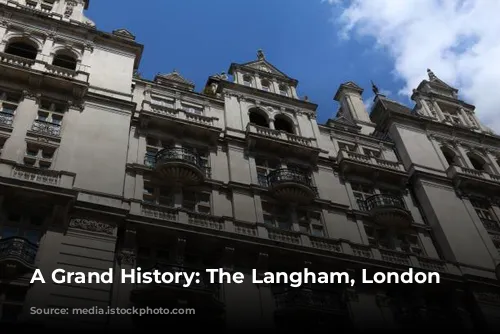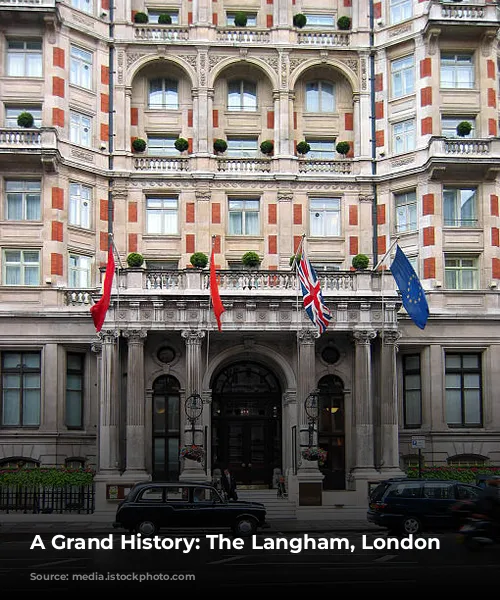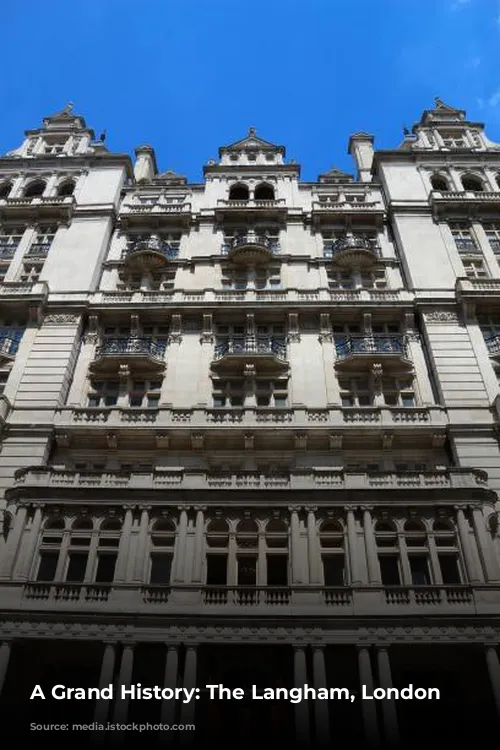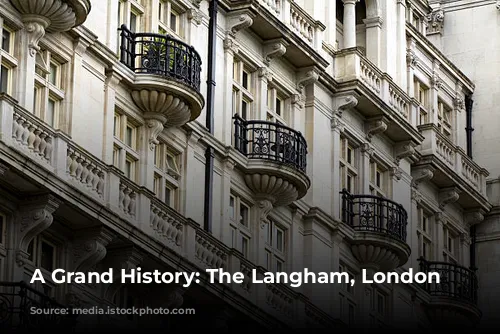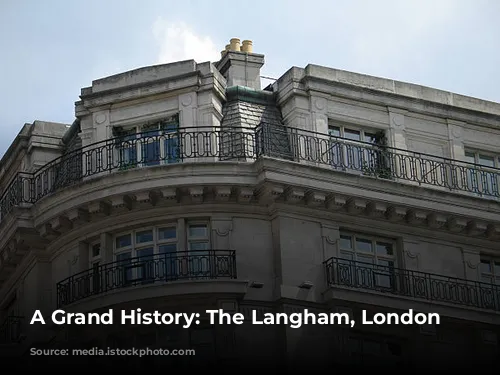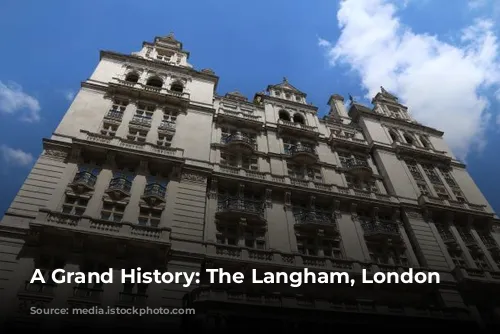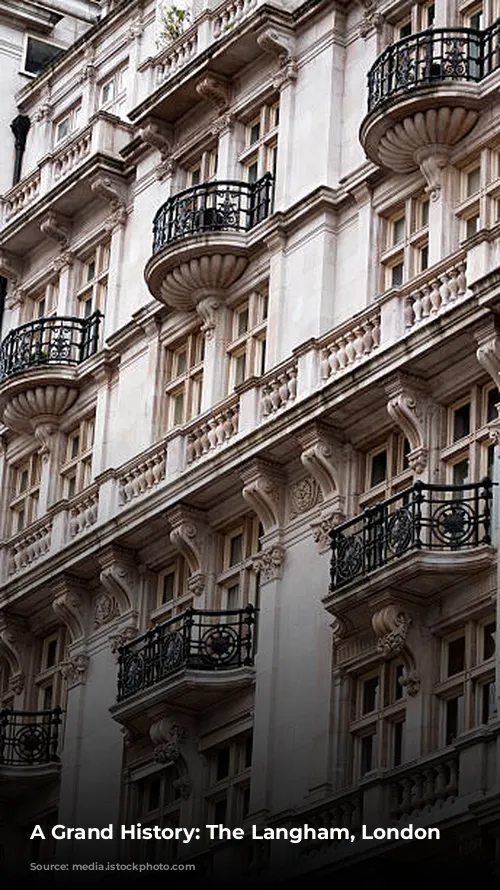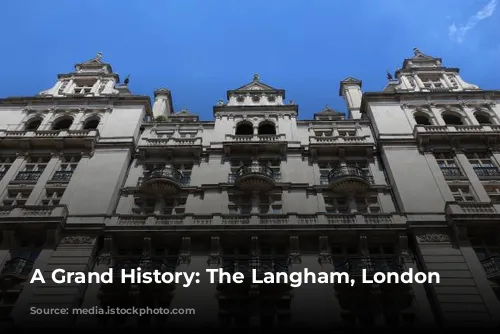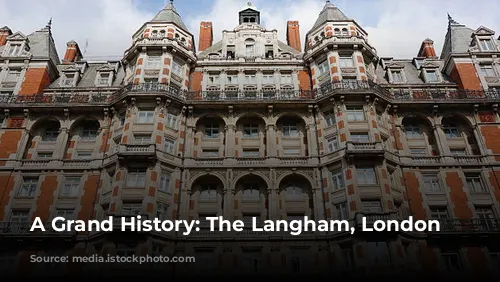The Langham, London, stands as a monument to the city’s rich history and architectural brilliance. This five-star hotel, nestled in the heart of Marylebone, has been a beacon of luxury and sophistication since its inception in the mid-19th century.
From Victorian Era to Modern Luxury
The Langham’s tale begins in 1863, when construction commenced under the visionary leadership of John Giles. A hefty £300,000 (equivalent to a staggering £36,230,425 in today’s money) was poured into bringing this grand vision to life. The hotel, upon its completion in 1865, was a marvel of modern engineering, boasting innovative features like hydraulic lifts and an abundance of amenities, including a hundred water closets and thirty-six bathrooms. Its grandeur was cemented by the opening ceremony, presided over by none other than the Prince of Wales.
Despite facing initial financial challenges, the Langham quickly rose to prominence, becoming a haven for the elite and a magnet for renowned figures. James Sanderson, a former Union Army officer, took the helm as general manager in 1867, ushering in an era of American clientele that included luminaries like Mark Twain and Hetty Green. The hotel’s allure extended beyond the Atlantic, captivating Napoleon III, Oscar Wilde, and musical giants like Dvorák, Toscanini, and Sibelius.
A Century of Grandeur and Transformation
The Langham continued its reign as a royal favorite throughout the 20th century, welcoming the likes of Princess Diana, Winston Churchill, and Charles de Gaulle. Its guest list reads like a who’s who of the era, featuring Noël Coward, Wallis Simpson, Don Bradman, and Emperor Haile Selassie of Ethiopia.
However, the hotel’s journey was not without its trials. The Great Depression dealt a heavy blow, forcing the owners to consider selling the property to the BBC. While the BBC opted for a different location, the Langham was not spared the devastation of World War II, suffering damage from bombs and being forced to close its doors. The BBC, however, saw its potential and ultimately purchased the hotel in 1965, using it as ancillary accommodation for Broadcasting House.
This period saw the hotel’s transformation from a luxurious haven to a less glamorous reality. The iconic Palm Court became a reference library, and the restaurant was re-purposed as a staff bar and refreshment room. The BBC’s attempt to demolish the hotel in 1980 and replace it with a modern office building was met with resistance and ultimately failed.
A Resurgence of Elegance
In 1986, the BBC sold the property to the Ladbroke Group, ushering in a new era of renovation and restoration. The Langham was reborn as the Langham Hilton in 1991, after a substantial £100 million refurbishment, once again reclaiming its status as a symbol of elegance. This chapter culminated in the hotel being acquired by Great Eagle Holdings in 1995, leading to further expansion and refurbishment.
A Legacy of Luxury and Culinary Excellence
The Langham, today, is a magnificent example of a hotel that has successfully bridged the gap between its illustrious past and contemporary expectations. With 380 rooms, a renovated Palm Court, and 15 function rooms including the Grand Ballroom, it offers a blend of modern luxury and timeless charm. Its culinary offerings are equally impressive, featuring Artesian, a renowned cocktail bar, and a private dining room, alongside The Good Front Room and Wigmore, a British tavern from Michel Roux Jr. The hotel’s commitment to culinary excellence is further exemplified by its cookery school, Sauce by The Langham, inaugurated in 2019.
An Enduring Symbol of History and Luxury
The Langham’s journey is a testament to its enduring appeal. It has played host to a remarkable cast of characters, witnessed historical milestones, and weathered turbulent times. Through its renovations and expansions, it has adapted to the changing times while remaining true to its heritage. The Langham stands as a powerful reminder of London’s vibrant history, a beacon of luxury and sophistication, and a destination that continues to enchant and inspire.
